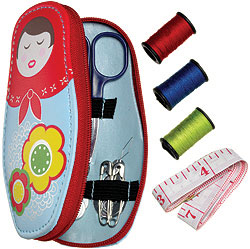Животное
The word for animal in Russian is животное. You will notice that it resembles the word живу ‘I live,’ and indeed the root жив- means ‘live.’ In fact in Old Russian the word живот meant life, although nowadays it means stomach. You'll note that животное has a neuter adjectival ending. I suspect that it originally was part of the phrase «животное существо» ‘living being,’ although that's just a guess. In any case, the word is now used as a noun, even though its endings are adjectival, and for that reason we can call it a deadjectival noun. It declines like this:
| Sg | Pl | |
| Nom | животное | животные |
| Acc | животных | |
| Gen | животного | |
| Pre | животном | |
| Dat | животному | животным |
| Ins | животным | животными |
Notice particularly that since the word is neuter, the accusative singular does NOT copy the genitive singular.
| Ты видишь то животное, которое лежит перед оградой? | Do you see that animal that is lying in front of the fence? |
| Какое красивое животное! | What a beautiful animal! |
| Миша любит животных. Он хочет быть ветеринаром. | Michael loves animals. He wants to be a veterinarian. |
| — Что это за животное? — Это утконос. Он интересен тем, что самцы утконоса ядовитые, что нетипично для млекопитающих. |
“What kind of animal is that?” “It's a platypus. It's interesting in that the males are poisonous, which is atypical for mammals.” |
Привозить/привезти
The verb pair привозить/привезти is usually translate as ‘to bring.’ It conjugates like this:
| Imperfective | Perfective | |
| Infinitive | привозить | привезти |
| Past | привозил привозила привозило привозили |
привёз привезла привезло привезли |
| Present | привожу привозишь привозит привозим привозите привозят |
No such thing as perfective present in Russian. |
| Future |
буду привозить будешь привозить будет привозить будем привозить будете привозить будут привозить |
привезу привезёшь привезёт привезём привезёте привезут |
| Imperative | привози(те) | привези(те) |
The bringer appears in the nominative case, and the thing brought appears in the accusative:
| — Кто привёз микроволновую печь? — Печь привезли папа и мама. |
“Who brought the microwave oven?” “The oven was brought by Dad and Mom.” |
| Вань, когда приедешь домой, привези, пожалуйста, двадцать кило картошки. | Ivan, when you come home, please bring twenty kilos of potatoes. |
When you bring something to a person, the person appears in the dative case.
| Смотри, какой красивый шарф мой двоюродный брат привёз мне из России! | Look what a nice scarf my cousin brought me from Russia! |
When you bring something to a place, you usually use в/на + accusative:
| Володя, привези с собой на дачу новую лопату. | Vladimir, bring a new shovel with you to the dacha. |
| Шофёр привозит свежий хлеб в ресторан три раза в неделю. | A driver brings fresh bread to the restaurant three times a week. |
Приносить/принести
The verb pair приносить/принести is usually translated as ‘to bring.’ It conjugates like this:
| Imperfective | Perfective | |
| Infinitive | приносить | принести |
| Past | приносил приносила приносило приносили |
принёс принесла принесло принесли |
| Present | приношу приносишь приносит приносим приносите приносят |
No such thing as perfective present in Russian. |
| Future |
буду приносить будешь приносить будет приносить будем приносить будете приносить будут приносить |
принесу принесёшь принесёт принесём принесёте принесут |
| Imperative | приноси(те) | принеси(те) |
The bringer appears in the nominative case, and the thing brought appears in the accusative:
| — Кто принёс эту картинку? — Картинку принесла Ксюша. |
“Who brought this painting?” “The painting was brought by Kseniya.” |
| Вань, принеси ножницы, пожалуйста. | Ivan, bring the scissors, please. |
When you bring something to a person, the person appears in the dative case.
| По пятницам папа всегда приносит маме цветы. | On Fridays Dad always brings Mom flowers. |
When you bring something to a place, you usually use в/на + accusative:
| Бывшая секретарша всегда приносила пирожные на работу. | The previous secretary always brought pastries to work. |
| Если принесёшь мобильник в ресторан, я покажу тебе, как скачать MP3 [эм-пэ-три]. | If you bring your cellphone to the restaurant, I'll show you how to download MP3s. |
For English speakers we must keep in mind a couple caveats about this verb pair. First of fall, since the verb implies taking something somewhere in your own arms, you can't use it to say you brought a person to a place unless the person you bring is a baby. Secondly, if you bring something from another city or country, you should use the verb привозить/привезти, which implies motion by vehicle.
Привет
Привет is a friendly greeting that is usually transated into English as ‘hi.’ It is a friendly greeting used among people who are already on good terms:
| — Привет, Лен! — Здравствуй, Тань! |
“Hi, Lena.” “Hello, Tanya.” |
| — Привет, Борь! Как дела? — Ой, не спрашивай. — В чём дело? — Моя девушка бросила меня. — Ничего страшного. Ведь ты с ней ходил только три дня. |
“Hi, Boris. How are you?” “Oh, don't ask.” “What's wrong?” “My girlfriend dumped me.” “No big deal. After all, you were only going out with her for three days.” |
The word is often used with передавать/передать to mean “say hi to so-and-so” or “give regards to”:
| Счастливого пути, Жанн. Передай бабушкe привет. | Have a good trip, Zhanna. Say ‘hi’ to Grandma for me. |
| Спасибо за вашу помощь, Антон Павлович. Когда вы вернётесь домой, не забудьте передать привет вашей супруге. | Thank you for your help, Anton Pavlovich. When you get home, don't forget to give my regards to your wife. |
| Привет, душенька. Как я рад быть дома! Между прочим, Василий Игоревич передаёт тебе привет. | Hi, Sweetie. I'm so glad to be home! By the way, Vasili Igorevich says ‘hello.’ |
My favorite use of привет is in the phrase «с приветом», which means that the person you're talking about has some quirks or is crazy or abnormal.
| — Передай соль, пожалуйста. — На что тебе соль? — На пиво. — Ты что, с приветом? Это дорогое немецкое пиво, нельзя его солить. |
“Pass the salt, please.” “What do you want the salt for?” “For the beer.” “What, are you crazy? This is expensive German beer. You can't put salt in it.” |
| — Скажи, как тебе новый заведующий? — Он с приветом. — В смысле? — Он ходит по отделу босиком. — Ну, да, это странно. |
“Tell me what you think of the new boss.” “He's weird.” “In what sense?” “He walks around the department barefoot.” “Well, yes, that's strange.” |
Нитка
С миру по нитке — голому рубаха.
Just a thread from everyone in the world, provides a man a shirt.
Literal translation: A thread each in the whole world- a shirt for the naked.

I like this quote. It's very Russian to take a sentimental concept like unity or charity and put it into practical terms. This proverb came up while I was searching for interesting uses for the word нитка-the singular for "thread."
| Sg | Pl | |
| Nom | нитка | нитки |
| Acc | нитку | нитки |
| Gen | нитки | ниток |
| Pre | нитке | нитках |
| Dat | нитке | ниткам |
| Ins | ниткой | нитками |
*Please note that in the genitive case you would not say "нитк" but "ниток." A lot of times when there is a genitive for a word with a hard consonant followed by "ка" the letter о will appear and divide the consonant and the к.
Here are some sentences:
Мама, где мои нитки?
Mom, where is all my thread?
Мне нужна красная нитка, пуговица оторвалась.
A button came off, I need the red thread.
Мы все нитки потеряли?! Как я буду шить без ниток?
We lost all the thread?! How am I supposed to sew with no thread?
Держи нитку с иголкой.
Keep the thread with the needle.

<< 1 ... 42 43 44 ...45 ...46 47 48 ...49 ...50 51 52 ... 158 >>